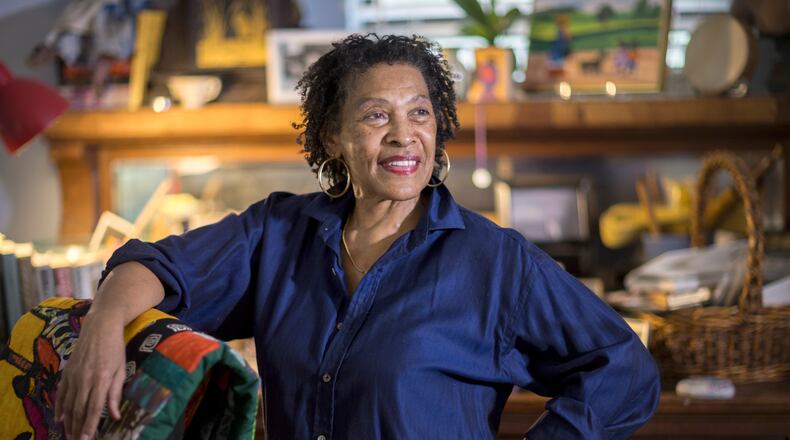Novelist Tina McElroy Ansa always knew she would be a writer.
The Macon, Georgia, native says she was born with a love and gift for writing. And growing up during the 1950′s and ‘60s listening when her parents and relatives often sat on the front porch sharing colorful stories of life experiences shaped her as a storyteller.
“I was immersed in all of this,” Ansa, 74, said, of her environment growing up. “This is how it was in most Black communities.”
Ansa attended Spelman College where her roommate was editor of the school newspaper and introduced Ansa to journalism as a career, encouraging her to take classes.
“I went over to Clark (College) to take some editing classes and I said, ‘You mean to tell me someone would pay me to do this?’” Ansa said. “It was wonderful. Editing classes were what I first took before writing classes.”
Credit: Stephen B. Morton for The Atlanta Journal Constitution
Credit: Stephen B. Morton for The Atlanta Journal Constitution
After graduation in 1971, Ansa knew she wanted to work in journalism in Atlanta. That year, she became the first Black woman to be hired at The Atlanta Constitution. Harmon Perry, who was hired in 1968, was the first Black reporter at The Atlanta Journal. The papers were separate publications at the time before merging in 2001 to become The Atlanta Journal-Constitution.
It was a time when newspapers were opening doors to Black people in efforts to have better access to communities of color.
“So much of the news was coming from the Black community,” Ansa said. “Civil rights issues all over the country were in the news; Nixon’s impeachment, (Watergate whistleblower) Martha Mitchell. Everything was happening, and Americans were seeing politicians for the first time (under such scrutiny).”
Ansa’s first experience working at The Atlanta Constitution, a morning newspaper, was on the copy desk where she worked with older veteran journalists who mentored her. It was an ideal launching pad where she could learn and grow.
“The copy desk was the perfect place for me,” Ansa said. “I had the best time.”
Credit: Stephen B. Morton for The Atlanta Journal Constitution
Credit: Stephen B. Morton for The Atlanta Journal Constitution
As the only black woman at the Atlanta Constitution, there were moments of feeling isolated from the rest of the staff.
But, she learned that the managing editor of The Atlanta Constitution, Jim Minter, set a positive foundation before her first day of work. He ensured that Ansa would be supported with encouragement and guidance in her work in the busy, unfiltered newsroom, she said.
“He was a cigar-chewing, cussing, spittin’ former sports editor and everyone was afraid of him,” Ansa remembers.
Ansa was able to easily move into other departments and become a reporter, and later a features editor.
Her first reporter assignment was to follow and cover a tornado. A subsequent story and her first national scoop came when an editor casually dropped her a tip that Hosea Williams would be removed as executive director of the Southern Christian Leadership Conference.
In 1979, Ansa was eight years into her employment and developing an increasing desire to write a novel. She decided to take a leave from journalism.
Ansa resigned and moved to Jacksonville, Florida with her husband Jonee’ for the beach life and the time to write. She recalls there were a dozen or so Black employees in the newsroom by that time.
She got little done on her novel over the next two years. Missing the camaraderie of the newsroom and people to share her work and ideas with, Ansa briefly returned to journalism, working for one year as a county editor for The Charlotte Observer.
Ansa said she became more focused on her novel when she left the North Carolina newspaper.
Her first novel “Baby of the Family” was named a New York Times Notable Book of the Year in 1989. It was followed by “Ugly Ways,” “The Hand I Fan With,” “You Know Better” and “Taking After Mudear: A Novel”
Ansa founded DownSouth Press to provide another avenue to publication for Black authors. Among its titles are “Meeting at the Table: African-American Women Write on Race, Culture and Community.” The book was published in 2020, and was brainstormed and edited by Ansa and her former college roommate, Wanda S. Lloyd. (Lloyd, a career journalist and educator, was inducted into the National Association of Black Journalists Hall of Fame.)
Credit: Courtesy Tina McElroy Ansa
Credit: Courtesy Tina McElroy Ansa
In addition to novel writing, Ansa has been a contributor to The Atlanta Journal-Constitution, The New York Times and other media companies for decades. She is a frequent speaker for workshops at universities and private retreats discussing her novels as well as life.
In January, Ansa spoke on life, grief and self-care during journalist Karen Hunter’s three-day Healthy Wealthy Wise Retreat in South Carolina.
Ansa’s husband Jonee’ died in 2020.
Ansa, who now lives on St. Simon’s Island, said looking back on her professional life, there is much that she could’ve never predicted.
The two newspapers where she was on staff are now led by Black editors. Her former roommate’s career included time as executive editor of a daily newspaper, the Montgomery Advertiser.
Other signs of change include Cynthia Tucker being named the first Black editorial page editor of The Atlanta Journal-Constitution in 1991. Leroy Chapman is the media company’s first Black Editor-in-chief after being promoted from managing editor in 2023.
“I don’t think I could’ve even allowed my mind to go there,” Ansa said, of high-ranking Black editors. “When you’re so deeply in the present, it’s hard to see outside the box. When I look back and think about all the things that come from being (the first or) the only one — no I could not have envisioned that.”
Ansa is currently working on her sixth novel as well as a nonfiction book, “Secrets of a Bogart Queen,” on how women find ways to break through what stands in their way.
About the Author
Keep Reading
The Latest
Featured






